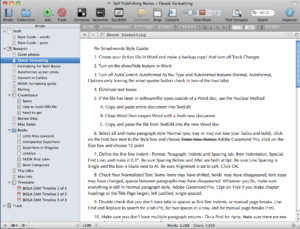I thought you might want to know more about the self-publishing class that I'll be teaching starting Monday. So here are some samples from some of my class lectures.
From Lecture 1
Welcome to my class on self-publishing your book! I’m glad you’re here. There are a lot of ways to get your book out into the world, and I’m going to present only a few. Then you’ll be able to take what you learn here, continue to research and learn more about your other options, and make changes (if you choose) in the future with more confidence.
The first things you’ll need to decide are:
- do you want to publish in ebook only, print only, or both?
- what software will you use?
- what distributors will you use?
Starting today, if you haven’t already started a notebook or computer file to save all the information you collect on self-publishing, do it now.
I use an ARC notebook from Staples to save everything that is already printed, or that I print out.
I prefer these because I like how easy it is to pull a piece of paper from one section and press it into another without having to open and close a 3-ring binder all the time. But whatever you like and will find easy to organize is what you should use.
I save different information – my house style guide, some how-to blogs that I’ve saved, a list of passwords and links to the distributors I use, and much more – in a Scrivener file.
From that Scrivener file, I can cut and paste links I need easier than if they were in a printed file, and I can continually update my style guide, add new books or formats (like audiobooks), and organize other information that I don’t feel the need to print.
From Lecture 2
In addition to the big choices – will I publish in ebook, print, or both formats? what software will I use? – you have a lot of detailed choices as well. This lesson will help familiarize you with some of those choices, and provide web sites where you can look up more information and/or sign up for the service.
Business Type
When you sign up for an account to publish your book with a distributor (KDP, Smashwords, etc.), you will need to provide your legal name (if you write with a pen name) and/or your business name. I chose to register a DBA (Doing Business As, also known as a Fictitious Business Name) so I could have a company name without the expense of setting up a corporation or LLC. You will have to do your own research on this, ask your accountant and/or attorney what is best for you because I am not qualified to give legal or financial advice.
If you live in California, here is a link to the state web site explaining the minimum tax if you set up a corporation or LLC. Google “[my state] minimum tax” to find out more about the tax consequences of setting up a corporation/LLC in your state.
https://www.ftb.ca.gov/individuals/faq/beMinTax.shtml
CHOICE: How will I set up my distributor accounts, and what do I need to do before I can sign up for those accounts?
Tax Identification Numbers
When you sign up with a distributor, you need to provide banking information and a tax ID number so you can get paid and so your earnings can be reported to the Internal Revenue Service.
If you run your business as a sole proprietor, with or without a DBA, you can use your social security number or you can apply for an Employer Identification Number (EIN). While I can’t give you legal or financial advice, here are some articles that may help you decide.
http://www.irs.gov/Businesses/Small-Businesses-&-Self-Employed/Employer-ID-Numbers-EINs
http://legal.answers.com/definitions/should-you-use-an-ein-or-your-social-security-number
http://info.legalzoom.com/need-ein-am-dba-23281.html
Depending on your bank and your business type, you may be able to set up a business checking account. (Your bank can tell you if they require an EIN for a sole proprietorship with or without a DBA, or if they will allow you to use your social security number.) Your royalties/earnings can be deposited there instead of your personal account to make accounting and taxes easier. Or your bank may only let you set up a separate personal checking account. Either way, you need to decide where you want your money deposited.
If you use PayPal, you may want to research how you can set up a separate PayPal account connected to your business checking so you can keep your business and personal finances separate.
CHOICE: How will I set up my banking for receiving payments and paying expenses?
ADDITIONAL CONSIDERATION: How will changing from one business type now (sole prop/DBA) to another later (corporation/LLC) affect my business? How will it affect my sales, sales rank, tax reporting, sales reporting, etc. from the vendors and distributors I’ve signed up with?
From Lecture 5
This lecture is not going to be an exhaustive how-to on using InDesign. You’ve either decided to learn it and you plan to use additional resources to do so, or you are already familiar with it to some degree. This will also help you get your book set up in InDesign if you have used Quark Xpress or Pagemaker or another desktop publishing program. There are enough similarities among the programs that knowing how to do this or that in one program gives you an idea of how to do it in another.
I’ll tell you what I do, and you can follow my directions, or just use them as a jumping off point to decide how you want to design your book’s interior. (You can also read along and ask yourself if this seems easy enough to learn. I think you’ll find it is.)
What I Do
Following are directions for creating a new file, making it into a template so you have all your settings saved for future books, and then adding your current manuscript to the template to create a new document.
Open InDesign
Go to File, New, Document
Under Intent on the popup screen, leave it as Print (the default)
Under Pages, make it a few more pages than you think it needs to be
Example: My superhero story is 100,000 words and came in at about 325 pages with the manuscript, the front and back matter, and the short excerpt of the next book at the end; my 8,000-word short story is about 36 pages with front and back matter and short excerpt
Under Page Size, choose Custom, then you’ll create a custom preset for all of your books
Adjust the width and height to the sizes you want for your print book (this won’t affect your EPUB if you create one from InDesign), and type in a name for the Custom Page Size.
Example: You could create one that is 4 1/8” x 6 7/8” and call it “Mass Market,” and create one that is 5” x 8” and call it “Trade Size.” Then you only need to choose which Custom Page Size you want to use this time.
Click on the Add button to save the name of the Custom Page Size. If you created more than one, click on the one you want and hit OK.
Leave the columns section as is if you are creating a novel template. Adjust your margins according to the CreateSpace guidelines. (You may have to click on the “chain” icon next to the top and bottom margins in order for your changes to save.)
Example: I use 0.75” for the top, bottom, and inside margins, and 0.5” on the outside margin
Sign Up Today!
These are just a few examples of what you'll learn in my 4-week online class, Your How-to Guide to Self-Publishing. You will receive 8 lectures with 92 pages of information, including screen shots, to help you get your book up for sale as an ebook and/or in print by the end of the class. Everyone will be encouraged to ask questions and offer suggestions to each other so that everyone can avoid or solve problems, and gain the newest information in an ever-changing industry.
Manuscript not ready? No problem. You can go through the lectures and practice with a dummy manuscript. This will give you an opportunity to ask questions about anything you don't understand so you can be ready when your manuscript is complete.
Check out my Classes page and sign up for the class. It starts Monday, January 12, 2015.





